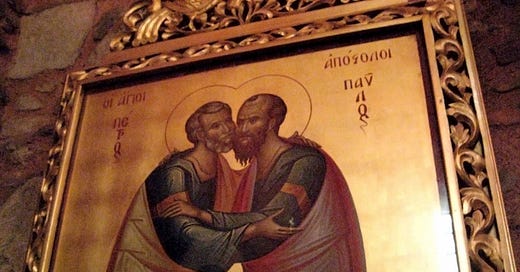The disciples have been asking: who is the greatest among them? Who will be saved? And now comes a somewhat infra dig request for preferential treatment in the celestial wedding breakfast’s seating plan:
James and John, the sons of Zebedee, come unto him, saying, Master, we would that thou shouldest do for us whatsoever we shall desire.
And he said unto them, What would ye that I should do for you?
They said unto him, Grant unto us that we may sit, one on thy right hand, and the other on thy left hand, in thy glory.
But Jesus said unto them, Ye know not what ye ask: can ye drink of the cup that I drink of? and be baptized with the baptism that I am baptized with?
And they said unto him, We can. And Jesus said unto them, Ye shall indeed drink of the cup that I drink of; and with the baptism that I am baptized withal shall ye be baptized:But to sit on my right hand and on my left hand is not mine to give; but it shall be given to them for whom it is prepared.
And when the ten heard it, they began to be much displeased with James and John.
But Jesus called them to him, and saith unto them, Ye know that they which are accounted to rule over the Gentiles exercise lordship over them; and their great ones exercise authority upon them.But so shall it not be among you: but whosoever will be great among you, shall be your minister:And whosoever of you will be the chiefest, shall be servant of all.For even the Son of man came not to be ministered unto, but to minister, and to give his life a ransom for many.
If we were to interpret this on modernity’s terms, what the “Sons of Thunder” are really asking for is power. At which point, Jesus gives them a good chiding followed up with a Padre’s hour pep-talk about “service.”
But as ever, there is more to the Gospel than moralising. Let’s think about who it is doing the asking: James and John, who have featured in this kind of story before. As they might. They were two of the three obvious leaders among the Twelve who had been chosen to go up Mount Tabor and see the Lord Jesus transfigured with heavenly brightness. So, it makes sense for them to ask to be next to the Lord “in His glory.” They have seen that Glory, and they want to be where Moses and Elijah were.
But it seems odd that the third of that hillwalking triumvirate, Peter, is excluded from this conversation. Jealousy, perhaps? I suggest a more symbolic reason. The clue is in the reference to right and left hands. Two equal and opposite principles are being invoked. The prophets declared that the kingly Messiah would sit at “God’s right hand;” the Church proclaims, Christ “sitteth on the right hand of the Father.” The right hand is the principle of rule and order. Thus, in the mystery of the Holy Trinity, the Divine Word, the Logos by whom chaos is ordered into meaningful creation, proceeds from the right hand of God; while the left yields that nebulous, free-flowing Spirit who gives vitality, movement and life. Authority and creativity: both are needed.
In today’s pairing, James, a leader of the early Church significant enough for Herod to have him beheaded in Jerusalem (Acts 12:2), symbolises the right hand of authority1; John, the beloved disciple who would truly recline next to the Lord at the Last Supper, then look after His mother, write a Gospel and establish an ascetic community, is equated with the creative left. Both would in due course drink deep of the Lord’s cup of martyrdom, which would unite and equalise them.
Peter is not part of their pairing because his opposite partner was yet to be revealed. Peter shares his feast day with Paul; and when those two are portrayed in Christian iconography, Peter is on the right and Paul on the left (from their perspective, not the viewer’s): on the right, Peter, bishop of Antioch and of Rome; on the left, Paul, the Abrahamic wanderer roaming freely on his quest to bring the wild gentiles into the fold.
James and John, Peter and Paul, Moses and Elijah, Boaz and Jachin, Martha and Mary: just some exemplars of the right-left balance needed for Church and soul. Christ paid His flesh and blood as ransom to free us from slavery, both to unbending external authority, and to the chaotic roving of our inner passions. We cannot master these ourselves. To gain perfect freedom, we must submit as slaves in service to the one who can: to the cornerstone who unites the twin pillars into one arch. We do so by dying with Him in Baptism and by inwardly digesting the Body and Blood of the Incarnate Word, that our souls may be reordered to His pattern, radiant with the Glory of His Spirit.
Though he was not, as I mistakenly wrote in the first draft of this sermon, the first Bishop of Jerusalem - that was James the Less, “brother of the Lord.” Sorry.





